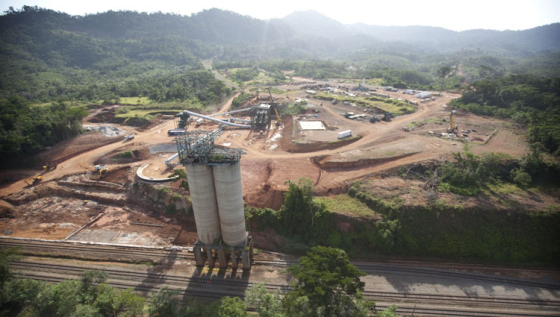Liberia: AML Spillage Poses Grave Threat to Farmers in Nimba

An AML mining site in Yekepa, Nimba County
…. EPA’s findings reveal, calls on the company provide alternative livelihoods for affected communities
A spillage of a chemical from a waste facility operated by ArcelorMittal Liberia (AML) has polluted water sources in Yekepa, Nimba County.
The situation, according to the Environmental Protection Agency, is depriving villagers of their livelihood and has resulted in a “eutrophic” condition leading to overgrowth of vegetation.
Contaminated sewage from the steel giant, the EPA said, was directly discharged into wetlands that border communities in its operational areas — resulting in negative consequences.
“The sewage discharge resulted in microbial proliferation, causing a corresponding negative impact on surface water quality,” EPA Executive Director Wilson Tarpeh disclosed.
“The sewage discharge has resulted in a eutrophic condition leading to overgrowth of vegetation. This has impacted the productivity of certain crops planted within the wetland.”
Tarpeh noted that the EPA has found that the "discharge” has created a condition that is unfavorable and unhealthy for “farmers using the wetlands.”
“The portion of the wetland impacted spans from the point of discharge to the point of confluence,” Tarpeh said, as he gave a sense of the spatial extent and magnitude of pollution.
A team of EPA technicians had on June 2, visited AML’s facility in Yekepa to investigate the sewage spillage, after which a series of recommendations were proffered.
The team instructed AML to hire an EPA-accredited third-party consulting firm to develop a restoration plan and implement the same under the supervision of the Agency within 60 days of the receipt of this report.
“That AML pays compensation to all affected farmers for damages caused to crops due to the pollution, and that the company provides an alternative livelihood for all farmers currently using the polluted portion of the wetland.”
AML was also mandated to repair damaged sewage lines in homes reporting damages.
The spillage, however, caused significant agitation within the community, leading to protests and demonstrations, as community members demanded fair compensation and the establishment of alternative livelihood sources.
The EPA, considering the urgency of the situation, on July 7, embarked on a five-day trip to AML to ensure that recommendations were being implemented.
At a consultative meeting, Tarpeh said that “As a result of EPA's intervention, the company has committed to providing immediate compensation to affected farmers for damages caused to their crops, utilizing the most recent crop price list from the Ministry of Agriculture.”
This decision will increase total compensation payments by US$16,377, he said.
Additionally, AML has agreed to initiate alternative livelihood programs in August of this year, with the EPA taking on the responsibility of closely monitoring the implementation process to ensure timely and effective execution.”
Other cardinal issues raised by the communities are yet to be addressed, even though the EPA says it remains engaged with both parties.
Meanwhile, the three affected communities have demanded the AML provide them with alternative drinking water sources as well as relocation while restoration of the affected swamp/wetland is taking place.
“We also want AML to provide food (rice and soup kind) for the over seven (7) plus affected communities for the period of five (5) years as reparation for damaged crops upon which they depend for their livelihood,” the communities said. “We also demand that all sick persons be taken to hospitals for advanced treatment.
